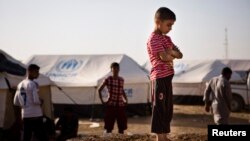ERBIL, IRAQ —
Sunni refugees from northern Iraqi towns overrun by jihadists and other militants say they are afraid to return because of Iraqi air force bombing runs and the threat of U.S. airstrikes.
Hundreds of thousands of Sunni Muslims have fled Mosul and other northern Iraq towns captured by fighters from the Islamic State of Iraq and the Levant (ISIL) and other militants.
Seeking some relief from the scorching sun baking a refugee camp an hour from Irbil in Iraqi Kurdistan, Shatha, a grandmother of four, explains why she is not ready to return to Mosul - and it has nothing to do with the jihadists.
Sitting in a blue U.N. refugee tent she is sharing with family members, she says she has already lost one son to an aerial bombardment. She worries about airstrikes and what Prime Minister Nouri al-Maliki will do to retake Mosul. She says she will not risk any other family members by going home too hastily.
On Wednesday, Iraq’s military claimed it had driven back Islamist militants from some towns and Prime Minister al-Maliki struck a confident note in his weekly televised address, saying the fight-back had begun.
Much of the fight is being led by airstrikes and there have been reports of bombing raids on Tikrit, the hometown of the late dictator Saddam Hussein.
But Sunni refugees are not alone in worrying about the consequences of aerial bombardment. Turkey’s Prime Minister Tayyip Erdogan warned Thursday against air strikes. He said air raids would inevitably lead to high civilian casualties because ISIL fighters and their Sunni militant allies are mixed in with civilians.
A refugee with seven children says the family left because they feared shelling and airstrikes.
Others in the camp say it was the immediate fighting that prompted them to flee.
Eighteen-year-old Masoud left Mosul with a sister and brother because of fighting and explosions. He says the situation was getting worse and bodies were laying in the street. He says they have no plans to return because of the jihadists and their fear of being bombed by Iraqi warplanes.
The Iraqi government has formally asked the United States for help and is requesting tactical airstrikes. But Obama administration officials have signaled their reluctance to use air power to assist the Iraqi military as it tries to reclaim territory seized in recent weeks by ISIL fighters and other insurgents, arguing such an action would be filled with complications.
Army General Martin E. Dempsey, the chairman of the U.S. Joint Chiefs of Staff, told a U.S. Senate committee identifying clear targets would be difficult with Sunni insurgents living close by local populations.
But the United States has been helping with intelligence and surveillance. Kurdish commanders, who are determined to keep jihadists from invading any of Iraqi Kurdistan, say U.S. drones have been flying and that information is being shared.
Hundreds of thousands of Sunni Muslims have fled Mosul and other northern Iraq towns captured by fighters from the Islamic State of Iraq and the Levant (ISIL) and other militants.
Seeking some relief from the scorching sun baking a refugee camp an hour from Irbil in Iraqi Kurdistan, Shatha, a grandmother of four, explains why she is not ready to return to Mosul - and it has nothing to do with the jihadists.
Sitting in a blue U.N. refugee tent she is sharing with family members, she says she has already lost one son to an aerial bombardment. She worries about airstrikes and what Prime Minister Nouri al-Maliki will do to retake Mosul. She says she will not risk any other family members by going home too hastily.
On Wednesday, Iraq’s military claimed it had driven back Islamist militants from some towns and Prime Minister al-Maliki struck a confident note in his weekly televised address, saying the fight-back had begun.
Much of the fight is being led by airstrikes and there have been reports of bombing raids on Tikrit, the hometown of the late dictator Saddam Hussein.
But Sunni refugees are not alone in worrying about the consequences of aerial bombardment. Turkey’s Prime Minister Tayyip Erdogan warned Thursday against air strikes. He said air raids would inevitably lead to high civilian casualties because ISIL fighters and their Sunni militant allies are mixed in with civilians.
A refugee with seven children says the family left because they feared shelling and airstrikes.
ISIL Attacks in Iraq
ISIL Attacks in Iraq- June 10: Mosul captured
- June 11: Tikrit and parts of Beiji captured
- June 12: Samarra and Dhuluiya captured
- June 13: Jalawla and Saadiyah captured
- June 14: Clashes in Ishaki and Dujail
- June 16: Tal Afar captured
Eighteen-year-old Masoud left Mosul with a sister and brother because of fighting and explosions. He says the situation was getting worse and bodies were laying in the street. He says they have no plans to return because of the jihadists and their fear of being bombed by Iraqi warplanes.
The Iraqi government has formally asked the United States for help and is requesting tactical airstrikes. But Obama administration officials have signaled their reluctance to use air power to assist the Iraqi military as it tries to reclaim territory seized in recent weeks by ISIL fighters and other insurgents, arguing such an action would be filled with complications.
Army General Martin E. Dempsey, the chairman of the U.S. Joint Chiefs of Staff, told a U.S. Senate committee identifying clear targets would be difficult with Sunni insurgents living close by local populations.
But the United States has been helping with intelligence and surveillance. Kurdish commanders, who are determined to keep jihadists from invading any of Iraqi Kurdistan, say U.S. drones have been flying and that information is being shared.






